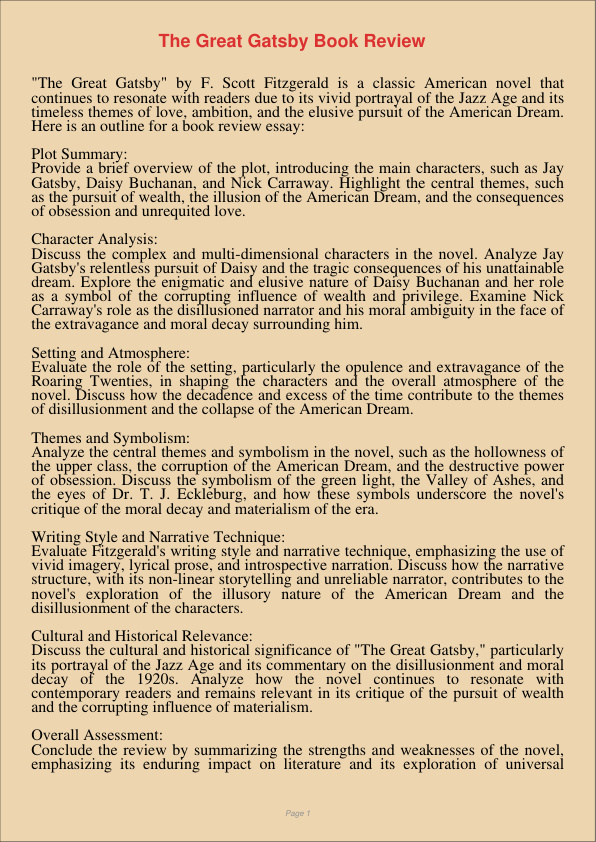The Great Gatsby Book Review
Dec 31, 2023
great gatsby book review
Environmental Studies
Philosophy

“The Great Gatsby” by F. Scott Fitzgerald is a classic American novel that continues to resonate with readers due to its vivid portrayal of the Jazz Age and its timeless themes of love, ambition, and the elusive pursuit of the American Dream. Here is an outline for a book review essay:
Plot Summary: Provide a brief overview of the plot, introducing the main characters, such as Jay Gatsby, Daisy Buchanan, and Nick Carraway. Highlight the central themes, such as the pursuit of wealth, the illusion of the American Dream, and the consequences of obsession and unrequited love.
Character Analysis: Discuss the complex and multi-dimensional characters in the novel. Analyze Jay Gatsby’s relentless pursuit of Daisy and the tragic consequences of his unattainable dream. Explore the enigmatic and elusive nature of Daisy Buchanan and her role as a symbol of the corrupting influence of wealth and privilege. Examine Nick Carraway’s role as the disillusioned narrator and his moral ambiguity in the face of the extravagance and moral decay surrounding him.
Setting and Atmosphere: Evaluate the role of the setting, particularly the opulence and extravagance of the Roaring Twenties, in shaping the characters and the overall atmosphere of the novel. Discuss how the decadence and excess of the time contribute to the themes of disillusionment and the collapse of the American Dream.
Themes and Symbolism: Analyze the central themes and symbolism in the novel, such as the hollowness of the upper class, the corruption of the American Dream, and the destructive power of obsession. Discuss the symbolism of the green light, the Valley of Ashes, and the eyes of Dr. T. J. Eckleburg, and how these symbols underscore the novel’s critique of the moral decay and materialism of the era.
Writing Style and Narrative Technique: Evaluate Fitzgerald’s writing style and narrative technique, emphasizing the use of vivid imagery, lyrical prose, and introspective narration. Discuss how the narrative structure, with its non-linear storytelling and unreliable narrator, contributes to the novel’s exploration of the illusory nature of the American Dream and the disillusionment of the characters.
Cultural and Historical Relevance: Discuss the cultural and historical significance of “The Great Gatsby,” particularly its portrayal of the Jazz Age and its commentary on the disillusionment and moral decay of the 1920s. Analyze how the novel continues to resonate with contemporary readers and remains relevant in its critique of the pursuit of wealth and the corrupting influence of materialism.
Overall Assessment: Conclude the review by summarizing the strengths and weaknesses of the novel, emphasizing its enduring impact on literature and its exploration of universal themes. Discuss how “The Great Gatsby” remains a poignant and powerful critique of the American Dream and the moral emptiness of a society obsessed with wealth and status.